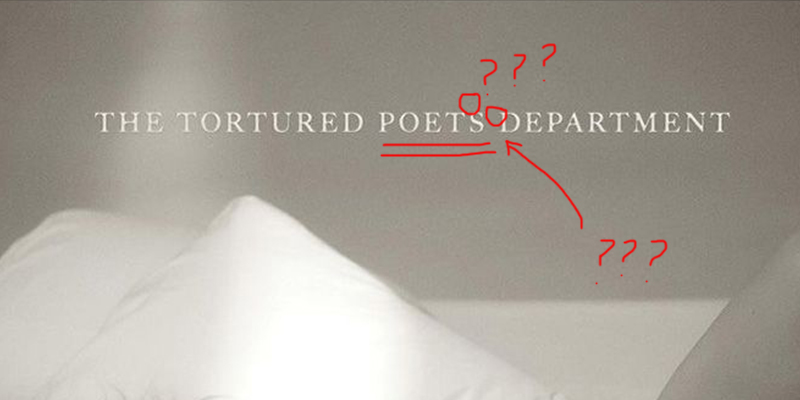Is the phrase The Tortured Poets Department grammatically correct?
Hello. Lots of folks have asked me if the phrase “The Tortured Poets Department,” which is the title of Taylor Swift’s new album, is grammatically correct. Maybe! It might be grammatically correct, but that depends on how she means the phrase. Let’s get into it!
IF IT’S CORRECT:
If Taylor intends the phrase as a non-possessive plural noun, then she is using the punctuation correctly. In this interpretation, Taylor would need to intend for this Department to be about Tortured Poets, to emphasize them, subject-wise. In this interpretation, The Tortured Poets Department is not a Department of Tortured Poets in the sense that they own it or run it or are even in it. They are the subject, the category. “Tortured Poets” as a concept is the main feature of the department, and the title is a description.
Think of it like “Biological Sciences Department” or “Foreign Languages Department.” It’s not “Biological Science’s Department,” or Biological Sciences’ Department,” or “Foreign Language’s Department” or “Foreign Languages’ Department,” all of which suggest that the subject owns a department.
(Then again, comparing this fake department title to a real academic department like the aforementioned Sciences or Languages departments is somewhat unhelpful, because most academic departments are less ambiguously named after the subject; in a university, a department such as the one Taylor suggests might be called The Tortured Poetry Department. But Taylor is emphasizing the collective of writers, and their state of being tortured, rather than the work they produce.)
In this interpretation, the Poets don’t possess the department the way the Dean might possess an Office. (That would be written as Dean’s Office, or, if it’s an office for multiple Deans, “Deans’ Office, or if it’s the office of someone named Deans, Deans’s Office.) But the Office serves the Dean the way the Department doesn’t serve the Poets. The Poets are, again, the feature and subject of this department, so the phrase is not possessive and therefore doesn’t need an apostrophe.
So, in order for the grammar to be correct, in this Department, everyone would study and teach about Tortured Poets, not simply be Tortured Poets.
IF IT’S INCORRECT:
If Taylor means that the Tortured Poets do possess or run the Department, or if it serves them in some way, she would need to have written the title as “The Tortured Poets’ Department,” with the apostrophe reflecting possessive plural. (“The Tortured Poet’s Department” would be if one poet owned the department, but that’s less likely? Unless she’s the only Tortured Poet in question, in which case, the grammar in her title is super wrong.)
If Taylor’s Department is made up of Tortured Poets as much as or more than it is organized around the concept of Tortured Poets, then the phrase would need an apostrophe in order to be grammatically correct.
Apparently, she borrowed the general vibe of the title from Joe Alwyn’s Group Chat “The Tortured Man Club.” There isn’t a grammatical problem with that, because the singular nature of the compound noun “tortured man” suggests that “to be in the club, you have to be a tortured man.” It doesn’t suggest that the club belongs to any one of them.
If she had called the album The Tortured Poet Club or The Tortured Poet Department, the phrasing would fall in line; to be in the Club or Department, it would seem that you’d have to be one of those Tortured Poets. But adding an “s” adds a whole new level of possessive speculation.
Actually, if she had called the album The Tortured Poet Club or even The Tortured Poets Club, it might have been more helpful, since “club” is a word that suggests a kind of collective government rather than the bureaucratic organization of a “department.” In a Club of Tortured Poets, it would seem that the Tortured Poets would run or own it or be responsible for it in some way, meaning the phrase would have to be written as “Tortured Poets’ Club.”
*
This album title is a wonky phrase and it relies on semantic assumptions! It’s possible to be right or wrong about if Taylor is right or wrong. It’s easy to conclude that the Poets WOULD in fact own or run or make up the department, making her current, specific presentation grammatically incorrect.
I don’t want to make an assumption either way. I’ve heard people say that proofreaders would have caught it if she used the grammar incorrectly, but I don’t think that’s the case; in the Miss Americana documentary, she couldn’t figure out how to use the Conditional Tense and no one helped her. “If I was the man,” is wrong. It’s “If I were the man.” I don’t believe that she has a grammatical Tree Paine on her team!
If there’s a chance that she borrowed the cadence from the title Dead Poets Society, it only muddies things further. The movie makes it clear that the eponymous group is a society honoring/about dead poets. But if the ghosts of those dead poets ran the society, it’d need to be the Dead Poets’ Society. The subject of the film is the factor which clarifies the intent and grammatical correctness of the title. So, I guess we’ll have to wait for Taylor’s album (and the song which shares its title, Track 2) to know for sure if it’s right or wrong.
Anyway, grammar is weird, language is weird, and it makes sense that many of us have been thinking about this phrasing. Good on us for thinking about apostrophe usage in everyday life! I commend everyone who has been engaging with this topic!





